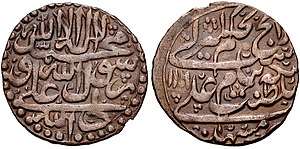Adel Shah
Adel Shah Afshar (also spelled Adil), born ʿAlī-qolī Khan (Modern Persian: عادل شاه افشار) (died 1749) was the Afsharid Shah of Iran from 1747 to 1748, a nephew and successor of Nader Shah, the founder of the Afsharid dynasty.
| Adel Shah | |
|---|---|
 Coin minted during the reign of Adel Shah | |
| Shah of the Afsharid dynasty | |
| Reign | 1747 – 1748 |
| Predecessor | Nader Shah |
| Successor | Ebrahim Afshar |
| Born | 1719 |
| Died | 29 September 1749 |
| Religion | Twelver Shia Islam |
Family and early career
Ali-qoli khan was the eldest son of Nader's brother, Ebrahim Khan. Nader appointed him governor of Mashad in 1737. In the same year he married Princess Ketevan, daughter of the Georgian king Teimuraz II, Nader's ally. In 1740 he was also married to a daughter of Abu'l-Fayz, ruler of the recently subdued Bokhara.[1]
Rise to power
From 1743 to 1747, Ali-qoli khan commanded Nader's troops against the Yazidis of Kurdistan, the Karakalpaks and Uzbeks of Khwarazm and in Sistan. He then ran in trouble with his uncle over the latter's decision to levy 100,000 tomans on him combined with Nader's suspiciousness. In April 1747, in conjunction with the rebels of Sistan, Ali-qoli khan occupied Herat and induced the Kurds to enter into a rebellion. Nader, while marching against the insurgents, was murdered by a group of his officers, who then offered the crown to Ali-qoli.[1]
On arriving at Mashad, Ali-qoli sent a loyal force to the fortress of Kalat, where they killed all of Nader's issue with the exception of his 14-year-old grandson Shahrokh Mirza. On 6 July 1747, he was declared the shah under the name of Adel-Shah, "the just king". He sent his brother Ebrahim Mirza as a governor to Isfahan, while he remained in Mashad with his unpopular Georgian favourite, Sohrab Khan. Later that year, he defeated his erstwhile Kurdish allies, who had refused to supply grain for his famine-stricken army and capital, and had several of his supporters put to death on suspicion of conspiracy. He then marched against Mazandaran in a futile attempt to bend the Qajar tribe into submission. The Qajar chief Mohammad Hasan Khan was killed and his four-year-old son, the future Agha Mohammad Khan, was castrated on Adel's orders.[1][2]
Overthrow and death
In the meantime, Ebrahim Mirza, who had consolidated his hold over western Iran, rose in rebellion against his reigning brother. He murdered Adel's favourite Sohrab Khan and in, June 1748, he marched to join his forces with Amir Aslan Khan, the sardar of Azerbaijan against Adel. The latter, at the head of a numerically superior army, advanced from Gilan to prevent the rebel forces combining, but the defection of many of his commanders precipitated his complete defeat. Adel fled to Tehran, but a local governor surrendered Adel to Ebrahim, who had him blinded. Six months later, Ebrahim was proclaimed shah, but his reign was quickly terminated by a coup which brought Nadir's surviving grandson Shahrokh Mirza to the throne. Ebrahim was blinded and soon died, while Adel was sent in chains to Mashad, where he was tortured to death.[1]
References
- J. R. Perry (December 15, 1983), "ʿĀdel Shah Afšār", in: Encyclopædia Iranica, Vol. I, Fasc. 5, p. 452. Iranica Online (Last Updated: July 22, 2011). Accessed April 16, 2012.
- Richard Tapper, Frontier Nomads of Iran: A Political and Social History of the Shahsevan (Cambridge University Press, 1997: ISBN 0-521-58336-5), p. 118.
| Preceded by Nader Shah Afshar |
Shah of Persia 1747–1748 |
Succeeded by Ebrahim Shah |